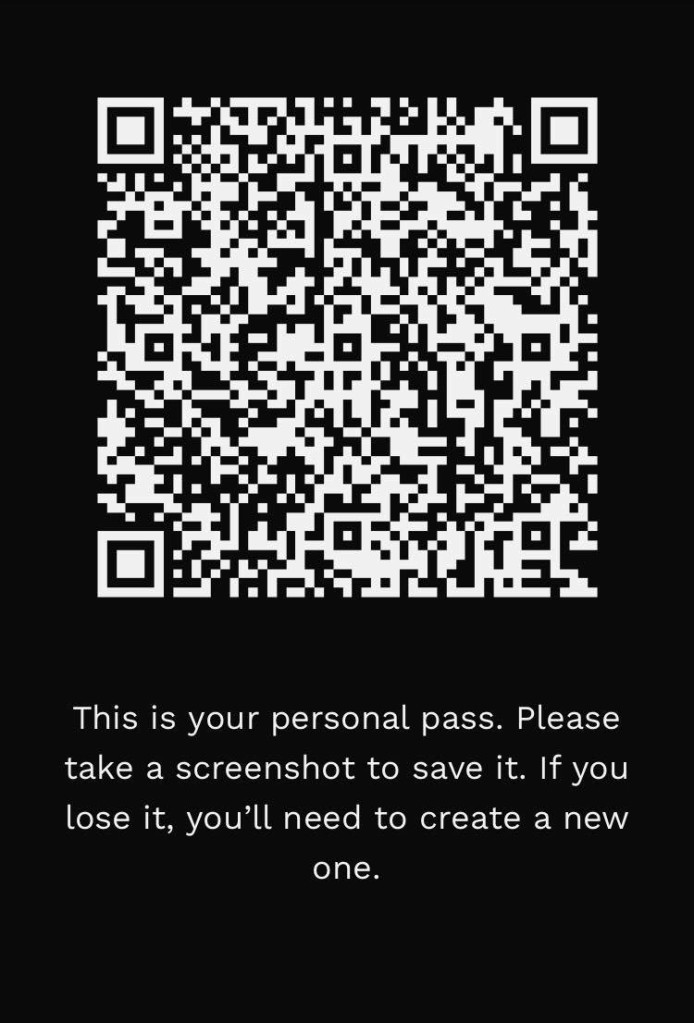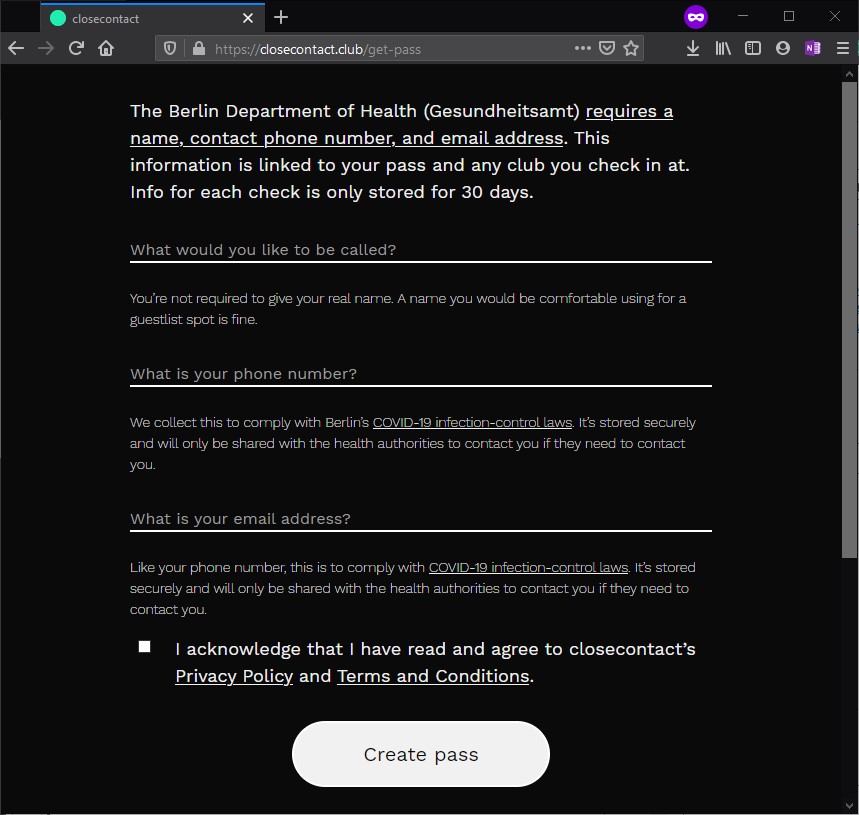With backing from the Berlin Club Commission and an experienced development team, closecontact is a simple but promising solution to pandemic contact sharing in the German capital.
If you’re in Berlin, you can go ahead and grab your pass in less time than it’ll take to read my sprawling prose.
A long winter lies ahead for cultural scenes worldwide. Even in Berlin, which has been spared the worst COVID-19 impact relative to the rest of Germany, let alone the rest of Europe or major cities like NYC, the virus still looms. (There’s wide fears of a second wave.) And what success has been here can be partly attributed to Germany’s aggressive, complete contact tracing.
Venues are now partially reopened and enjoying some of the warm summer climate – with patrons largely seated and distanced, Biergarten-style. Indoors, they’ve mounted art interventions and whatnot, albeit with greatly restricted admission capacity. (Those guests enter masked and a greater distance from anyone else.)

But all of this is possible partly because of Berlin’s tough rules for tracking contact information for guests – and an accompanying, strict policy on privacy. (“Kontaktverfolgung” is the policy; DE-language information.) Those two go hand in hand: if people trust their government, and trust their information remains more private, they’re more likely to cooperate with efforts to track infections. (Weirdly, I got to experience this system in 2019, when, despite two vaccinations, I contracted a mild case of the measles and got to meet my friendly Gesundheitsamt trackers.)
This system has been far from perfect; your neighborhood Kneipe likely just has a pad of paper, and even big clubs have done the same. (No one will mistake Berlin for Shanghai.) A couple of minor outbreaks in Berlin recently were difficult to track as people used false names.
closecontact simply deals with that issue – how do you collect the contact information of a guest, without them getting virus all over your pen and paper, then store that information accurately, then delete the same information and protect their privacy?
It’s really simple for the user. You go to a website (closecontact.club), enter your phone number and email address, a name of your choosing (which can even be an alias), and you get a QR code. The phone number and email are what’s required by the contact tracers, so they can reach you quickly in case they find out you’re in a potential chain of infection. That’s good for you – it means you know to keep yourself isolated, get a test, and avoid infecting your friends, family, and others.

When you get to the participating club door and meet … Sven or whomever … you just get your QR code scanner and you’re on your way.
There is a ton of security. Passes themselves are encrypted – a far cry from writing your email and phone number on a piece of paper where everyone sees it. And there’s asymmetric encryption with per-club keys. It’s very simple and transparent to you, but it’s very difficult for anyone to get their hands on the information. (See a full explanation for details and a bunch of flow charts; I prefer to focus my technical explanations on synths at the moment.)
As per Berlin law, the database is even deleted after 30 days (7 days for backups).
This is just one piece in the puzzle. “Normal” club operation is a pretty distant fantasy at the moment, because we have a deadly virus that spreads easily without symptoms, and can be airborne. So further reopenings for actual dancing would require other discussions (air filtration, more social distancing and hygeine, maybe even testing).
But – back to those fake names on paper – closecontact could help contain any potential outbreaks and allow better contact tracing. It also means greater ease of mind about safety and security for anyone going to a club for a beer, as a nice alternative to scrawling your personal contact information in view of strangers all over town.
In other cities, an unexpected outbreak combined with fake names and failed precautions has wound up closing entire commercial districts. (See, for instance, in the spring in Seoul, Korea – and that’s in a country that also has been a relative role model.)
These kinds of shutdowns could be devastating to the nightlife business, and in particular service workers already in precarious financial situations. That’s true even in fairly wealthy Germany.
So it’s little surprise that closecontact has a lot of backing. The development team comes from the likes of SoundCloud, Beatport, Ableton, LiveNation, and Defected Records – I know a few of them – with backgrounds in engineering, law, and design. And there’s support from the Berlin Club Commission, too, which has been a stalwart advocate of the city’s nightlife.
In fact, if there’s any criticism here, it’s really outside the Web app itself. The questions remain about how much interaction will even be possible in the coming months without a vaccine, and a lot of clubgoers are still in denial about the dangers of the virus. Without people taking personal responsibility around masking and social distancing precautions, these various apps can do little. And it’s also clear that these tools are only minor mitigation efforts – the entertainment industry and its workers, in particular, will still require large-scale government interventions, worldwide. But it’s a step.
This is not an app to trace the disease itself, either. Deutsche Welle has a great article on how these apps are doing worldwide. Germany’s app has been successful relative to some countries. But while it’s great at privacy, it’s maybe not so great at the rest of what it’s meant to do. While this bug is now reportedly fixed, at one point it actually failed to warn users due to widespread issues.
Club Commission wrote this endorsement today to Berlin clubs in their network (translated from the original German):
Since the beginning of the Corona crisis, the Club Commission has been in contact with various vendors regarding guest registration. In cooperation with our data protection expert, we have now found a provider of a digital, secure, and free solution that we would like to recommend to you today: closecontact is a Web application specially developed for Berlin nightlife to document guest data in response to the COVID-19 pandemic. Conceived and designed by a team of local music-savvy technicians, closecontact offers nightclubs a simple but crucial tool for guest tracking in strict compliance with infection control regulations and data protection regulations.
See also: Club Commission on the state of Berlin clubs (DE).
Photo credit, top: Juska Wendland. Some rights reserved. I’ll let you guess which door that is. (see you in comments)
See Juska’s wonderful series: